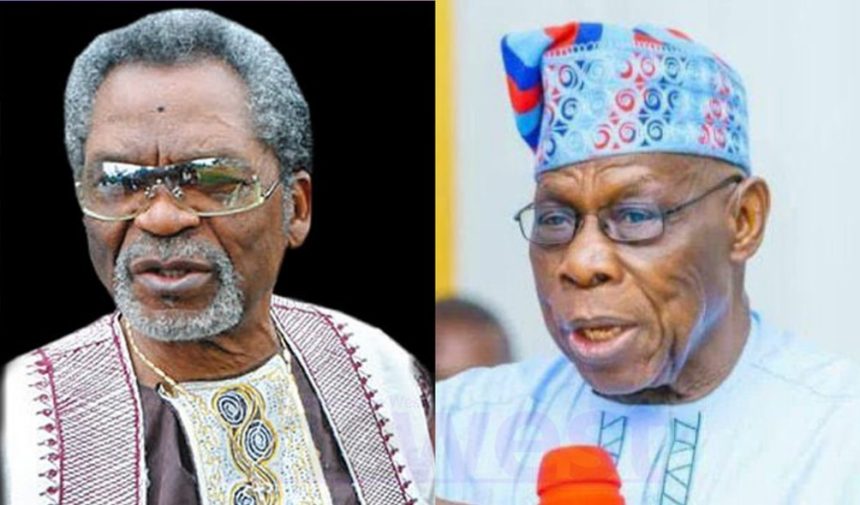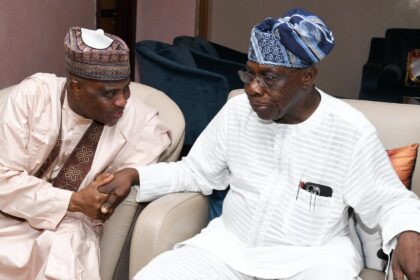The family of the late legal luminary and political icon, Dr. Tunji Braithwaite, has strongly condemned former President Olusegun Obasanjo for what they described as “offensive and snide remarks” made against their patriarch during the recent book launch of former military leader, General Ibrahim Babangida (IBB), in Abuja.
SPeaking at a press conference held at the Braithwaite family residence in Victoria Island, Lagos, on Monday, Barrister Olumide Braithwaite, the late statesman’s son, delivered a scathing rejoinder on behalf of the family, accusing Obasanjo of attempting to tarnish the legacy of his father, whom he hailed as a “nationalist, patriot, and fearless critic of military juntas.”
The controversy stems from Obasanjo’s speech at the IBB book launch on February 20, 2025, where he reportedly referred to Tunji Braithwaite as “such a character” and accused him of harbouring “bad belle” (ill will) during his lifetime. Obasanjo made the remarks while cautioning IBB to expect criticism of his book, drawing parallels to the criticisms he faced when he released his own book years ago.
“It is not, and never will be, in Obasanjo’s place to use Tunji Braithwaite’s name as a punching bag,” Olumide Braithwaite declared. “While he was alive, it never happened. The name Tunji Braithwaite still has its bite. Whoever dares to tarnish Tunji Braithwaite’s name will have his children and his mass followers to contend with.”
The Braithwaite family accused Obasanjo of displaying “presidential petulance” and attempting to rewrite history by downplaying the late lawyer’s contributions to Nigeria’s democracy and human rights struggles. They emphasised that Tunji Braithwaite was not merely a critic of Obasanjo but a fiery opponent of all military regimes, including those of Obasanjo, IBB, and the late General Sani Abacha.
“Tunji Braithwaite fought against the draconian decrees of successive military juntas of Obasanjo, IBB, and Abacha,” Olumide stated. “He was on record as a civilian from 1977 to 1998, fighting their inhumane treatment of the masses of this country.”
The family also recounted specific instances of Braithwaite’s defiance against military oppression, including his legal defence of the late Afrobeat legend Fela Anikulapo-Kuti, whose mother, Funmilayo Ransome-Kuti, was tragically killed during a military raid ordered by Obasanjo’s regime.
“History will recount how Fela’s house was burnt to the ground and his mother was thrown out from a one-storey building by soldiers acting on the orders of Obasanjo’s regime of terror,” Olumide said. “The Fela case became a benchmark of fundamental human rights law in Nigeria, even though justice was denied.”
The Braithwaite family further highlighted Tunji Braithwaite’s political activism, including the formation of the Nigeria Advance Party (NAP) in 1978, which was initially denied registration by the Obasanjo-led military government. They also recalled how IBB’s regime targeted Braithwaite’s businesses and detained him on allegations of coup plotting in 1990.
“This house witnessed two truckloads of heavily armed soldiers storming the premises in the middle of the night to whisk away Tunji Braithwaite to an unknown location,” Olumide recounted. “It was former Attorney General Olu Onagoruwa who fought for his release in court.”
The family expressed disappointment that Obasanjo, a fellow Yoruba man, failed to pay his respects when Tunji Braithwaite passed away in 2016, unlike other prominent figures such as President Bola Tinubu and former Vice President Yemi Osinbajo, who visited the family to honour the late statesman.
Olumide Braithwaite urged Obasanjo to be more mindful of his words and to acknowledge the contributions of individuals like his father, whom he described as “an exemplary nationalist.”
“Legacy is not what’s left tomorrow when you are gone. It’s what you give, create, and contribute today while you are here,” Olumide said, quoting American author Seth Godin. “Dr. Tunji Braithwaite’s legacy is already cemented without the need for man-made titles or self-aggrandisement.”








